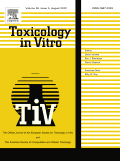
TOXICOLOGY IN VITRO
Scope & Guideline
Transforming Toxicology through Cutting-Edge Research
Introduction
Aims and Scopes
- In Vitro Toxicity Assessment:
The journal emphasizes the use of in vitro models to assess the cytotoxic and genotoxic effects of various chemicals, including pharmaceuticals, environmental pollutants, and food additives, thereby promoting alternative testing methods. - Mechanistic Studies:
Research often focuses on elucidating the mechanisms of toxicity at the cellular and molecular levels, including studies on oxidative stress, apoptosis, and the role of specific signaling pathways in mediating toxic effects. - Development of New Methodologies:
The journal encourages contributions that introduce novel in vitro techniques or modifications to existing methods, such as high-throughput screening, 3D cell cultures, and organ-on-a-chip technologies. - Pharmacokinetics and Toxicokinetics:
Papers frequently explore the absorption, distribution, metabolism, and excretion of chemicals using in vitro models, facilitating a better understanding of how substances interact with biological systems. - Regulatory Science and Risk Assessment:
The journal addresses the integration of in vitro data into regulatory frameworks and risk assessment processes, providing insights that can influence policy and guidelines for chemical safety.
Trending and Emerging
- Nanotoxicology:
There is a growing body of work focused on the toxicity of nanoparticles and nanomaterials, exploring their interactions with biological systems and potential health risks, which is increasingly relevant given the rise of nanotechnology. - Microplastics and Environmental Pollutants:
Research on the toxicological effects of microplastics and associated environmental pollutants has surged, highlighting concerns about their widespread presence and impact on health. - 3D and Organ-on-a-Chip Models:
Increasing interest in three-dimensional cell cultures and organ-on-a-chip technologies is evident, with studies emphasizing their advantages in mimicking physiological conditions more accurately than traditional models. - Biomarkers and Molecular Mechanisms:
There is an emerging trend towards identifying specific biomarkers of toxicity and elucidating molecular mechanisms, which aids in the development of targeted interventions and risk assessments. - Integrative Approaches in Toxicology:
The integration of omics technologies (genomics, proteomics, metabolomics) with in vitro studies is gaining traction, providing comprehensive insights into the biological effects of toxicants.
Declining or Waning
- Traditional Animal Models:
As the journal promotes in vitro methods, traditional animal testing approaches are becoming less frequently discussed, reflecting a broader trend towards reducing animal use in research. - General Toxicity Testing without Mechanistic Insights:
There is a noticeable decrease in studies that report general toxicity findings without delving into the mechanistic aspects, as the emphasis shifts towards understanding specific pathways and molecular interactions. - Single Cell Type Studies:
Research focusing solely on single cell type models is waning, with a growing preference for complex multicellular systems that better mimic in vivo environments. - Static Culture Systems:
Static two-dimensional culture systems are being replaced by more advanced models such as three-dimensional cultures and organoids, leading to a decline in publications centered around traditional static methods.
Similar Journals
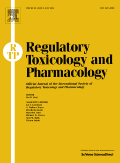
REGULATORY TOXICOLOGY AND PHARMACOLOGY
Transforming Knowledge into Action for Drug SafetyREGULATORY TOXICOLOGY AND PHARMACOLOGY is a prestigious peer-reviewed journal published by Academic Press Inc. Elsevier Science, dedicated to advancing knowledge in the fields of toxicology and pharmacology. With an esteemed impact factor and a current ranking of Q2 in both Medicine and Toxicology, this journal serves as a critical resource for researchers, professionals, and students interested in the regulatory aspects of drug safety and environmental toxicology. The journal publishes original research articles, reviews, and regulatory updates that reflect the latest insights and methodologies in safety assessment and toxicological research. Established in 1970, the journal continues to play an integral role in shaping the scientific discourse around regulatory practices in pharmacology, ensuring that both academic and practical perspectives are captured. Readers can access the articles through subscription services, allowing them to stay informed of the most significant developments in the field.
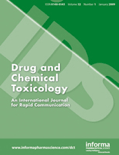
DRUG AND CHEMICAL TOXICOLOGY
Championing interdisciplinary research in toxicology.Drug and Chemical Toxicology is a well-respected journal in the fields of toxicology, pharmacology, and public health, published by Taylor & Francis Ltd. Since its inception in 1978, this journal has diligently explored the effects and mechanisms of chemical exposures on health and the environment, fulfilling a crucial role in advancing scientific understanding and safeguarding public health. The journal is indexed across prestigious databases and features an impressive array of articles categorized within the Q2 and Q3 quartiles across various categories in 2023, reflecting its significance in Chemical Health and Safety as well as Environmental and Occupational Health disciplines. With an extensive reach and a focus on interdisciplinary research, Drug and Chemical Toxicology offers a rich repository of original research, reviews, and methodological advancements, catering to a diverse audience of researchers, professionals, and students dedicated to the betterment of safety and health standards. Although not an open-access publication, its articles are widely accessible to the academic community, ensuring that critical innovations and insights are shared for the greater good.
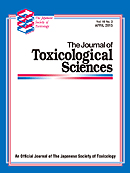
JOURNAL OF TOXICOLOGICAL SCIENCES
Fostering Collaboration in Toxicological ResearchThe Journal of Toxicological Sciences, published by the Japanese Society of Toxicological Sciences, is a prominent academic journal dedicated to the comprehensive study of toxicology and its related fields. Since its inception in 1976, the journal has provided a vital platform for researchers and professionals to disseminate innovative findings and insights in toxicology, with a focus on both experimental and clinical studies. Positioned in the Q3 quartile across various relevant categories, including Medicine (miscellaneous) and Toxicology as of 2023, the journal plays an essential role in advancing our understanding of toxic substances and their effects on biological systems. Although currently not open access, the journal maintains high academic standards and is indexed in Scopus, ranking #96 in Toxicology. Offering unique perspectives from Japan, it encourages global collaboration and discourse among toxicologists, making it an invaluable resource for students, researchers, and industry professionals alike.

Pakistan Journal of Pharmaceutical Sciences
Advancing pharmaceutical research for a healthier tomorrow.Pakistan Journal of Pharmaceutical Sciences, published by the University of Karachi, serves as a vital platform for advancing research in the field of pharmaceutical sciences. With a strong commitment to disseminating innovative findings and critical studies since its inception in 1995, the journal focuses on a wide array of topics including pharmacology, toxicology, and pharmaceutics. With an ISSN of 1011-601X, it holds a reputable position within the academic community, reflecting its Q3 category ranking in Pharmaceutical Science as of 2023. While the journal is currently not designated as Open Access, it remains accessible through institutional subscriptions, ensuring that both emerging and established researchers can contribute to and benefit from its scholarly content. This publication not only promotes scientific dialogue but also aims to bridge the gap between academia and industry, appealing to a diverse audience of researchers, professionals, and students seeking to stay informed about the latest advancements and trends in pharmaceutical research.
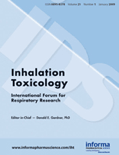
INHALATION TOXICOLOGY
Pioneering Insights into Airborne Exposures.Inhalation Toxicology, published by Taylor & Francis Ltd, is a premier journal dedicated to advancing the field of toxicology with a particular focus on inhalation exposure and its impact on human health. Established in 1989, this journal provides a vital platform for original research, reviews, and case studies that explore the toxicological effects of inhaled substances, making it essential reading for researchers, health professionals, and regulatory scientists. With an Impact Factor that situates it in the Q3 category in both Health, Toxicology and Mutagenesis, the journal asserts its relevance within the scientific community, particularly emphasizing its contributions as indexed by Scopus rankings in related fields. Although it follows a traditional access model, the journal's commitment to delivering high-quality research continues to foster significant discussions and advancements in understanding inhalation toxicology. For those at the forefront of environmental science and pharmacology, Inhalation Toxicology is an indispensable resource for both current research and future innovations in the discipline.

CHEMICAL RESEARCH IN TOXICOLOGY
Unveiling the complexities of chemical toxicity for a safer future.Chemical Research in Toxicology is a premier journal published by the American Chemical Society, dedicated to advancing the understanding of toxicological effects associated with chemical substances. Since its inception in 1988, this esteemed journal has maintained a robust impact factor, ranking in the Q1 quartile for both Medicine (miscellaneous) and Toxicology as of 2023, reflecting its significance and influence in the fields of pharmacology and toxicology. With an impressive Scopus ranking at #16 out of 133 in the Toxicology category, it serves as a vital resource for researchers, professionals, and students seeking cutting-edge insights and scholarly articles that bridge the gap between chemistry and toxicological science. Although not an open-access publication, it continues to provide comprehensive analyses and original research that inform safe chemical practices and regulatory policies, further enhancing its role in public health and safety.

Current Research in Toxicology
Exploring the Frontiers of Toxicology ScienceCurrent Research in Toxicology is a pioneering journal published by ELSEVIER that serves as a vital platform for disseminating cutting-edge research in the field of toxicology, spanning from biological impacts to pharmacological applications. With an ISSN of 2666-027X and an impressive Q2 ranking in key categories such as Applied Microbiology and Biotechnology, Health, Toxicology and Mutagenesis, and Toxicology, this journal underscores its commitment to high-quality research and significant contributions to the scientific community. Based in the Netherlands, Current Research in Toxicology aims to bridge the gap between academia and industry by providing rigorously peer-reviewed articles that cover a wide array of topics including novel methodologies, regulatory challenges, and emerging trends within the domain. The journal is accessible through various platforms, making it essential for researchers, professionals, and students eager to stay updated on the latest findings and advancements in toxicology. With a comprehensive focus on integrating theory with practical application, this journal is poised to influence future studies and policies in health and environmental science.

Toxicological Research
Unraveling the complexities of toxic substances for better health.Toxicological Research is a prominent academic journal dedicated to advancing the field of toxicology through rigorous exploration and innovative research. Published by the Korean Society of Toxicology, this journal serves as a vital resource for researchers, professionals, and students engaged in environmental science, pharmacology, and toxicology. With an ISSN of 1976-8257 and an E-ISSN of 2234-2753, Toxicological Research highlights significant findings and discussions in the realm of health, toxicology, and mutagenesis. Although not an open-access journal, it maintains a solid reputation as evidenced by its Q3 ranking in both health-related toxicology and general toxicology categories for 2023. The journal covers a broad spectrum of topics from fundamental research to applied toxicology and provides a unique platform for the dissemination of knowledge in a field that is increasingly relevant in today’s society. With an anticipated convergence period from 2008 to 2024, Toxicological Research continues to contribute vital insights to understanding the implications of toxic substances on health and the environment.
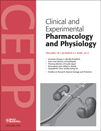
CLINICAL AND EXPERIMENTAL PHARMACOLOGY AND PHYSIOLOGY
Connecting Experimental Insights with Clinical ApplicationsCLINICAL AND EXPERIMENTAL PHARMACOLOGY AND PHYSIOLOGY, published by WILEY, is a premier journal that serves as a vital resource for researchers, professionals, and students in the fields of pharmacology and physiology. With ISSN 0305-1870 and E-ISSN 1440-1681, this journal has established itself as a significant contributor to scientific dialogue since its inception in 1974. Currently spanning until 2024, it consistently publishes cutting-edge research addressing both experimental and clinical advancements in pharmacology and physiology. Recognized for its quality, it holds a Q2 ranking in the 2023 Pharmacology category and notable Q3 rankings in both Physiology and Medical Physiology. The journal's coverage of topical issues not only ensures a robust platform for innovative findings but also fosters collaborations across disciplines. Although not an Open Access journal, its curated content is invaluable for advancing knowledge, as evidenced by its solid Scopus rankings, which place it within the top percentiles of its field. Engaging with this journal means staying at the forefront of research that shapes clinical practices and experimental methodologies.
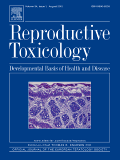
REPRODUCTIVE TOXICOLOGY
Illuminating the effects of toxicants on reproductive systems.REPRODUCTIVE TOXICOLOGY, published by Pergamon-Elsevier Science Ltd, stands as a pivotal journal in the field of toxicology, specifically focusing on the effects of environmental and pharmaceutical agents on reproductive health. Established in 1987, the journal has a rich history of contributing to the scientific community, and it continues to publish rigorous research and reviews that illuminate the intricate relationships between various toxicants and their reproductive impacts. With an impressive 2023 Q2 ranking in Toxicology and a Scopus ranking of #42 out of 133 in the Toxicology category, REPRODUCTIVE TOXICOLOGY emphasizes high-quality scholarly work that influences both academia and industry practices. Researchers, professionals, and students in toxicology, pharmacology, and public health will find this journal an invaluable resource for staying informed on the latest findings and methodologies in reproductive toxicology. While the journal currently adheres to traditional publishing models without open access options, its authoritative content remains accessible to a global audience interested in advancing the understanding of toxicological impacts on reproduction.